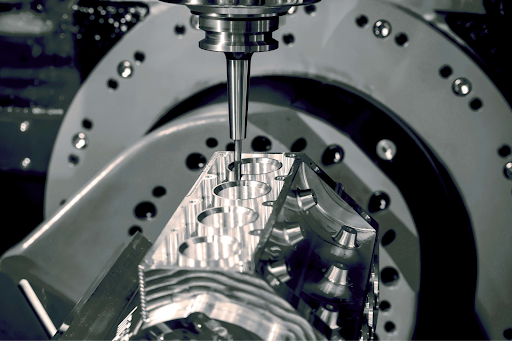Introduction
Machining is a high-precision manufacturing process used to create durable, tight-tolerance components for aerospace, medical, automotive, and industrial applications. Unlike 3D printing or thermoforming, CNC Machining requires materials that can withstand cutting, milling, and drilling without excessive wear or distortion.
Selecting the right metal or plastic affects cost, machinability, and performance. This guide explores the best materials for machining, comparing their mechanical properties, difficulty to machine, and cost-effectiveness.
Machining Metals: Strength, Cost, and Machinability
Aluminum: Lightweight and Easy to Machine
Aluminum is highly machinable, corrosion-resistant, and used in aerospace, automotive, and structural components.
- 6061 Aluminum is cost-effective and easy to machine.
- 7075 Aluminum is stronger but harder to work with.
Machinability: Excellent | Cost: Moderate
Stainless Steel: Corrosion-Resistant and Durable
Used in medical, marine, and industrial applications, stainless steel offers high strength but is harder to machine.
- 303 Stainless Steel is the easiest to machine.
- 316 Stainless Steel is highly corrosion-resistant but more difficult to cut.
Machinability: Moderate to Difficult | Cost: High
Carbon Steel: Strong and Affordable
Carbon steel is cost-effective and strong but requires coatings to prevent rust.
- 1018 Carbon Steel is highly machinable.
- 1045 Carbon Steel is tougher but harder to cut.
Machinability: Excellent | Cost: Low to Moderate
Titanium: High-Strength, High-Cost
Titanium is stronger than steel and 45% lighter, used in aerospace and medical implants but difficult to machine.
- Grade 5 Titanium (Ti-6Al-4V) is the strongest and most wear-resistant.
Machinability: Difficult | Cost: Very High
Machining Plastics: Lightweight, Wear-Resistant, and Cost-Effective
Delrin (Acetal/POM): Low-Friction and Precision-Friendly
Delrin is easy to machine, wear-resistant, and used in gears and mechanical components.
Machinability: Excellent | Cost: Moderate
Nylon: Strong and Self-Lubricating
Nylon is impact-resistant and lightweight but absorbs moisture, affecting stability.
Machinability: Moderate | Cost: Low
PTFE (Teflon®): Extreme Chemical and Heat Resistance
PTFE is chemically inert but soft, making it harder to machine precisely.
Machinability: Difficult | Cost: High
PEEK: Aerospace-Grade Performance
PEEK withstands high temperatures and chemical exposure but is expensive and abrasive to machine.
Machinability: Difficult | Cost: Very High
Conclusion: Selecting the Best Machining Material
Material choice impacts cost, strength, machinability, and durability.
- For easy machining and affordability, aluminum and carbon steel are great options.
- For corrosion resistance, stainless steel and PEEK perform best.
- For high strength with low weight, titanium is unmatched.
- For wear-resistant plastics, Delrin and Nylon are cost-effective.
At RapidMade, we offer expert machining services to help you choose the best material for your needs.
For custom machining solutions, visit rapidmade.com or contact [email protected].

